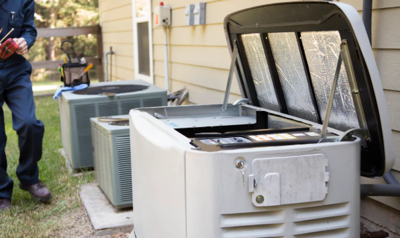
When severe weather strikes or an unexpected power outage hits, a home generator can be the difference between discomfort and safety. Whether it’s preserving your food, keeping your medical equipment running, or simply being able to charge your phone, having backup power gives you peace of mind. But with several options available, how do you choose the right generator for your home?
This guide will walk you through the two most common types of generators, portable and standby, and help you make an informed decision based on your needs, lifestyle, and budget.
Understanding Your Options
There are two primary types of home generators to consider: portable generators and home standby generators. Each has distinct features, installation needs, fuel types, and usage scenarios.
Portable Generators: A Flexible and Budget-Friendly Solution
Portable generators are a popular option for homeowners who want a simple, flexible solution without a high upfront cost. These units are ideal for temporary use and can be set up quickly when an outage occurs.
Installation
One of the biggest advantages of portable generators is that they don’t require professional installation. You can store one in your garage or shed and roll it out when needed, making them an accessible choice for anyone who wants immediate backup power with minimal setup.
Starting and Usage
Portable generators typically feature a manual pull-cord start. While this isn’t as convenient as automatic systems, it’s reliable and effective in an emergency. Once powered on, you plug extension cords into the generator to power specific appliances and devices. It’s important to note that portable generators should always be used outdoors in a well-ventilated area to avoid carbon monoxide poisoning.
Fuel Type
Most portable generators run on gasoline, meaning you’ll need to store fuel and be prepared to refuel during extended outages. It’s a good idea to keep several gallons of fuel on hand, especially if you live in an area prone to frequent storms.
What It Can Power
A portable generator can power select items in your home during an outage, including essentials like a refrigerator, a few lights, a space heater, or a window AC unit. The exact capacity depends on the size and wattage of the generator you choose. Remember that you’ll need to prioritize which items are plugged in to avoid overloading the unit.
Home Standby Generators: Reliable Power Without the Hassle
For homeowners looking for a more robust and permanent solution, home standby generators are the gold standard. These generators are designed to power your home automatically when the main power supply is interrupted, offering a seamless transition in times of crisis.
Installation
Unlike portable units, standby generators are permanently installed and wired directly into your home’s electrical system by a licensed electrician. Installation includes an automatic transfer switch that instantly turns the generator on when power is lost and switches it back off when the utility service is restored.
Starting and Usage
Home standby generators are fully automatic, so no manual start is required. Whether you’re at home or away, the generator senses a power loss and kicks in to keep your home running without any effort on your part. This hands-free operation makes them ideal for homeowners who travel frequently or have health concerns requiring constant electricity.
Fuel Type
Standby generators typically run on natural gas or liquid propane, so they do not require manual refueling during extended outages. They’re connected to your home’s existing gas lines, so the fuel supply is continuous as long as your utilities are functioning.
What It Can Power
A home standby generator can power essential appliances like refrigerators, lights, and medical equipment. Depending on the size of the generator, it can also support high-wattage appliances such as your air conditioning system, electric stove, washer/dryer, and more. During installation, you’ll work with your electrician to pre-select which systems and appliances you want to be powered during an outage.
Which Generator Is Right for You?
When choosing between a portable and standby generator, consider the following:
Budget: Portable generators are more affordable upfront, while standby units are a larger investment with installation costs.
Convenience: Standby generators provide seamless operation and peace of mind, especially if you’re not always home.
Power Needs: If you only need to run a few essentials, a portable generator may suffice. But if you want to keep your entire home functioning as normal, a standby generator is the better choice.
Frequency of Outages: If you live in an area with frequent or lengthy power outages, investing in a standby generator can pay off quickly.
Health and Safety Concerns: The reliability of a standby generator can be invaluable for households with medical equipment or young children.
Still unsure which option is best for your home? The professionals at A-Abel Electrical can help you evaluate your home’s energy needs and recommend the generator that best fits your situation. Don’t wait until the next outage leaves you in the dark! Take the time to prepare today and keep your home running no matter what tomorrow brings.



(0) comments
We welcome your comments
Log In
Post a comment as Guest
Keep it Clean. Please avoid obscene, vulgar, lewd, racist or sexually-oriented language.
PLEASE TURN OFF YOUR CAPS LOCK.
Don't Threaten. Threats of harming another person will not be tolerated.
Be Truthful. Don't knowingly lie about anyone or anything.
Be Nice. No racism, sexism or any sort of -ism that is degrading to another person.
Be Proactive. Use the 'Report' link on each comment to let us know of abusive posts.
Share with Us. We'd love to hear eyewitness accounts, the history behind an article.